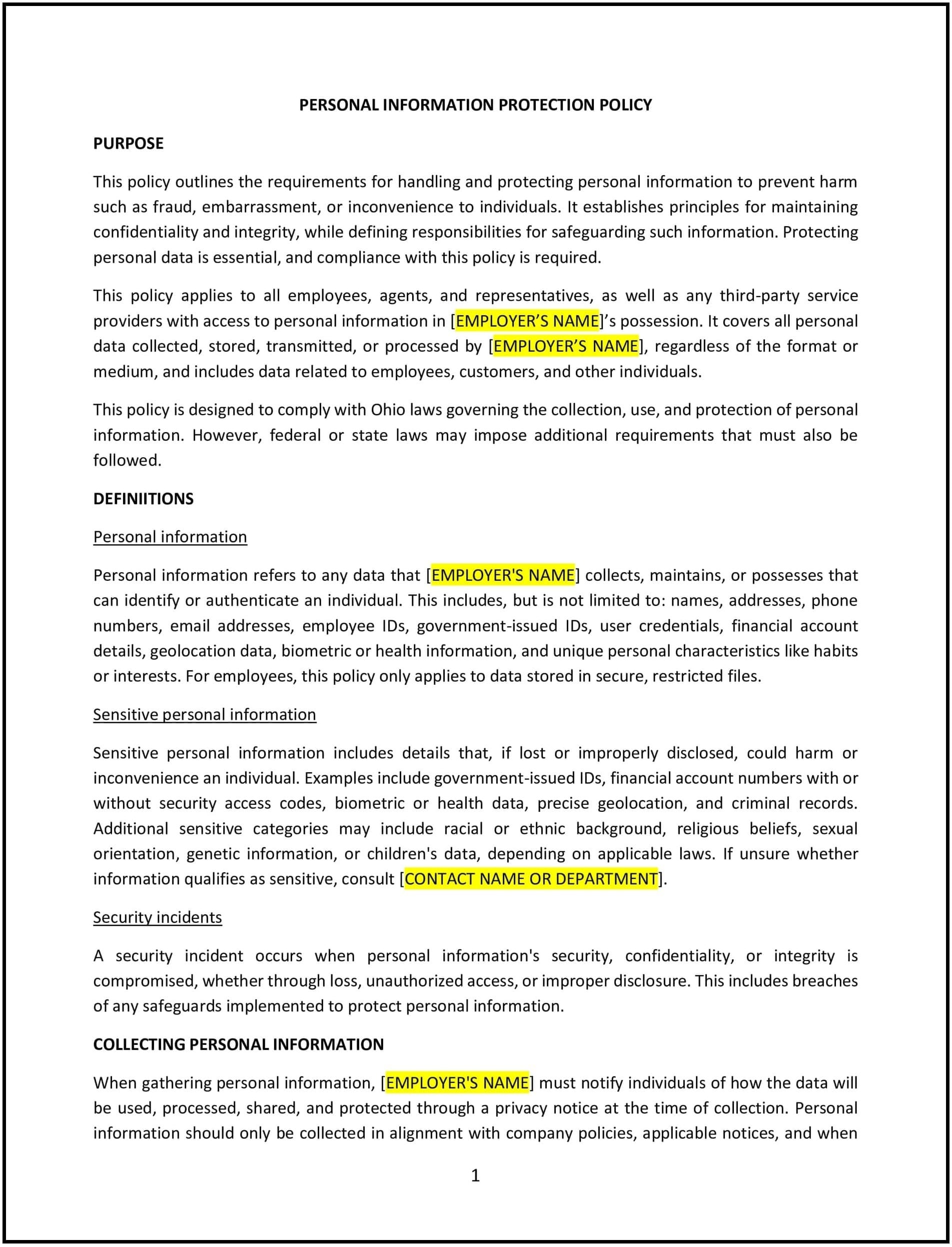Personal information protection policy (Ohio): Free template
Got contracts to review? While you're here for policies, let Cobrief make contract review effortless—start your free review now.

Customize this template for free
Personal information protection policy (Ohio)
A personal information protection policy provides Ohio businesses with guidelines for handling and protecting personal data and sensitive information of employees, customers, and other stakeholders. This policy outlines how personal information should be collected, stored, processed, and shared, ensuring that the business complies with relevant privacy laws and regulations. It also specifies the responsibilities of employees in safeguarding personal information and the procedures to follow in case of a data breach or security incident.
By implementing this policy, Ohio businesses can protect sensitive personal data, mitigate the risk of data breaches, and support compliance with privacy regulations like the Ohio Data Protection Act and federal laws such as the GDPR (if applicable).
How to use this personal information protection policy (Ohio)
- Define personal information: The policy should clearly define what constitutes "personal information" within the context of the business, such as names, addresses, contact information, social security numbers, and financial data. It should specify which types of information are considered sensitive and require additional protection.
- Set guidelines for data collection: The policy should explain how personal data is collected, ensuring that businesses obtain data fairly and with consent where necessary. It should outline the purpose of data collection and clarify that only essential information should be collected.
- Address data storage and security: The policy should specify how personal information will be stored and protected, including encryption, access controls, and secure storage methods. It should set guidelines for limiting access to personal information to authorized personnel only.
- Specify data retention and deletion procedures: The policy should outline how long personal information will be retained and when it will be deleted. It should include a process for securely deleting or anonymizing data when it is no longer needed for business purposes.
- Set guidelines for data sharing and third-party access: The policy should specify how personal data may be shared with third parties, including vendors or contractors, and the conditions under which data can be shared. It should ensure that third parties comply with privacy standards and sign confidentiality agreements if necessary.
- Address data breach response: The policy should define the steps to be taken in case of a data breach or security incident, including how the breach will be detected, reported, and investigated. It should specify the notification procedures for affected individuals and regulatory bodies if required.
- Define employee responsibilities: The policy should make it clear that all employees are responsible for safeguarding personal information and adhering to the company’s privacy and security practices. It should outline the consequences of non-compliance, including disciplinary action.
- Review and update regularly: The policy should be reviewed periodically to ensure it remains aligned with Ohio state laws, federal regulations, and best practices for data protection. It should also be updated to reflect any changes in technology or business practices.
Benefits of using this personal information protection policy (Ohio)
This policy provides several key benefits for Ohio businesses:
- Protects sensitive data: By setting clear guidelines for handling personal information, the policy helps protect sensitive data from unauthorized access, misuse, or theft.
- Mitigates legal risks: The policy helps businesses comply with Ohio’s data protection laws and other relevant regulations, reducing the risk of legal penalties, fines, or reputational damage due to data breaches.
- Fosters trust with customers and employees: By demonstrating a commitment to safeguarding personal information, the policy helps build trust with customers, employees, and other stakeholders, encouraging loyalty and positive relationships.
- Reduces the risk of data breaches: A well-defined policy reduces the likelihood of data breaches by establishing secure data handling, storage, and disposal practices, helping to prevent unauthorized access or leakage of sensitive information.
- Promotes transparency: The policy ensures that employees and customers understand how their personal information will be collected, stored, and used, promoting transparency in data handling practices.
- Enhances compliance with regulations: By aligning with Ohio state laws and federal regulations like GDPR (if applicable), the policy helps businesses stay compliant with legal data protection requirements, avoiding potential penalties.
- Improves data management practices: The policy supports better data management by providing clear guidelines on data retention, deletion, and sharing, helping businesses maintain organized and secure information systems.
Tips for using this personal information protection policy (Ohio)
- Communicate the policy clearly: Ensure that all employees are aware of the personal information protection policy by including it in the employee handbook, reviewing it during onboarding, and conducting periodic training on data protection practices.
- Monitor compliance: Implement a system for regularly monitoring compliance with the policy, including periodic audits of data handling and storage practices to ensure they align with the guidelines outlined in the policy.
- Educate employees on data security: Provide training on how to handle sensitive information securely, including practices such as strong password usage, recognizing phishing attempts, and protecting physical and digital documents.
- Be transparent with customers: Clearly inform customers about how their personal information will be used, stored, and protected. Provide them with the option to opt-out of certain data practices where applicable, in line with privacy regulations.
- Implement robust security measures: Ensure that technical safeguards, such as encryption, firewalls, and secure access controls, are in place to protect personal information from unauthorized access or breaches.
- Respond swiftly to breaches: Establish a clear and efficient process for responding to data breaches or security incidents. This includes quick detection, reporting, and notifying affected individuals in accordance with legal requirements.
- Review regularly: Periodically review the policy to ensure it is aligned with current Ohio state laws, federal regulations, and evolving best practices in personal data protection.